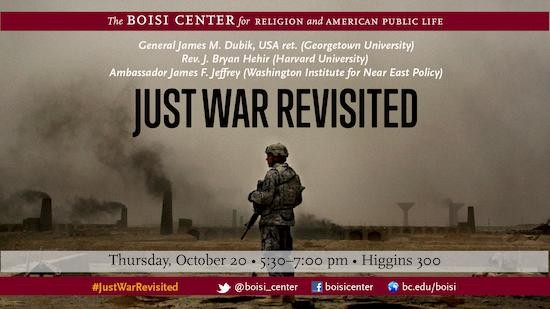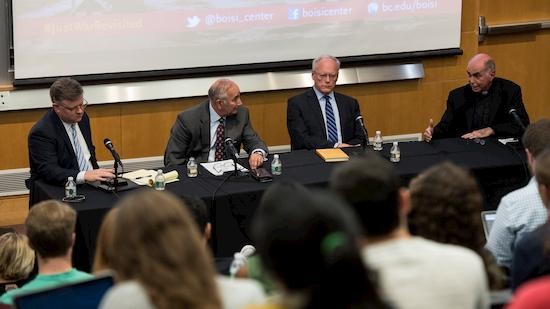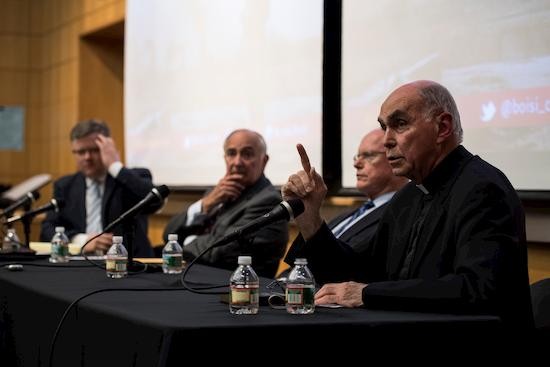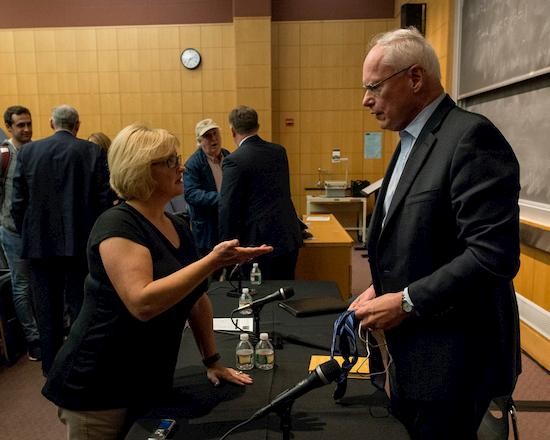Just War Revisited

General James Dubik, U.S. Army, ret., Georgetown University
Rev. J. Bryan Hehir, Harvard University
Ambassador James F. Jeffrey, The Washington Institute for Near East Policy
Date: October 20, 2016
Abstract
Is just war theory relevant in a twenty-first century world? Our three panelists bring decades of intellectual thought and practical experience to the discussion. Together the panel will reflect on the utility of the just war paradigm in an era of conflict dominated by threats and weapons that challenge traditional just war categories. We will hear whether and how just war principles are integrated into discussions at the highest levels of government decision-making, what influence popular understandings (and misunderstandings) of these concepts have in the political realm, and whether alternative paradigms such as “just peace” are gaining traction in conversations outside the religious context.
Speaker Bios

General James M. Dubik, U.S. Army (Ret.) is professor of the practice and Director of Teaching at the Center for Security Studies at Georgetown University’s Walsh School of Foreign Service. During his 37 years of active duty in the United States Army as an infantryman, paratrooper and Ranger, he commanded U.S. and multi-national troops in Haiti, Bosnia, and Iraq (during the Surge of 2007-2008), among other locations, retiring at the rank of lieutenant general.
Gen. Dubik is also currently a Senior Fellow at the Institute for the Study of War, as well as the Institute of Land Warfare, and is a member of the Council on Foreign Relations. In 2012 and 2013 he held the Omar Bradley Chair of Strategic Leadership, a position co-sponsored by Dickinson College, Penn State Law School, and the U.S. Army War College. Gen. Dubik holds a Ph.D. in philosophy from Johns Hopkins University, and is the co-author of the book Envisioning Future Warfare. His new book is titled Just War Reconsidered: Strategy, Ethics, and Theory.

Rev. J. Bryan Hehir is the Parker Gilbert Montgomery Professor of the Practice of Religion and Public Life at the Harvard Kennedy School of Government. A Catholic diocesan priest, he is also the Secretary for Health Care and Social Services in the Archdiocese of Boston, and a close advisor to Cardinal Sean O’Malley. Fr. Hehir’s research and writing focus on ethics and foreign policy, and the role of religion in world politics and in American society. He is one of the world’s foremost experts on just war theory, and has a long history of engagement with policymakers in the U.S. government. Previously he served on the staff of the U.S. Conference of Catholic Bishops, where he was a lead author of the influential 1983 pastoral letter on war and peace entitled The Challenge of Peace. He has also served as President of Catholic Charities USA, and on the faculties of Georgetown University and Harvard Divinity School, the latter of which he led for three years as chair of the executive committee. Hehir holds A.B. and M.Div. degrees from St. John’s Seminary, and a Th.D. from Harvard Divinity School. He is the 2016 recipient of the Martin E. Marty Public Understanding Religion Award.

Ambassador James F. Jeffrey is the Philip Solondz distinguished fellow at The Washington Institute for Near East Policy, where he focuses on U.S. diplomatic and military strategy in the Middle East, with emphasis on Turkey, Iraq, and Iran. One of the nation's most senior diplomats, Ambassador Jeffrey has held a series of highly sensitive posts in Washington D.C. and abroad. In addition to his service as U.S. ambassador in Ankara and Baghdad, he served as assistant to the president and deputy national security advisor in the George W. Bush administration, with a special focus on Iran. He previously served as principal deputy assistant secretary for the Bureau of Near Eastern Affairs at the Department of State, where his responsibilities included leading the Iran policy team and coordinating public diplomacy. Earlier appointments included service as senior advisor on Iraq to the secretary of state; chargé d'affaires and deputy chief of mission in Baghdad; deputy chief of mission in Ankara; and ambassador to Albania.
A former infantry officer in the U.S. army, Ambassador Jeffrey served in Germany and Vietnam from 1969 to 1976. He is a graduate of Northeastern University (B.A.) and Boston University (M.A.).
Event Photos

General James Dubik (center left), Ambassador James F. Jeffrey (center right), and Rev. J. Bryan Hehir discussed the nuances, successes, and limitations of just war theory in the 21st century at a Boisi Center panel discussion on October 20. Boisi Center interim director, Erik Owens (far left) introduced the panelists.



Photos by MTS Photography
Event Recap
On October 20, 2016, General James Dubik, U.S. Army, ret., Reverend J. Bryan Hehir, and Ambassador James F. Jeffrey discussed applications of just war theory in the modern age. The panel discussion focused on Dubik’s book, Just War Reconsidered (University of Kentucky, 2016), which reassesses just war theory and highlights the ethical accountability of political and military leaders not only in initiating wars, but also in strategizing and executing plans in war.
Dubik laid out three elements of just war: ethical cause for entering war, the principle of proportionality (including protection of the innocent during war), and reflection in the aftermath of war. Dubik argued that the traditional interpretation of just war theory tends to alienate military and political leaders from their moral roles. In this model, leaders are responsible for making an ethically informed choice about whether or not to initiate war, but troops bear the responsibility of fighting war ethically. Dubik rejected this approach, claiming that traditional just war theory does not address the moral consequences of war-waging. He emphasized that war is more than just fighting; it involves strategy and decision-making that affects soldiers, civilians, communities, governments, and political relationships before, during, and after war. Dubik also questioned the tendency of theorists to draw a sharp line between military and political leaders. To make just war possible in practice, the military and political perspectives must exist in dialogue, recognizing the moral agency and responsibility of all individuals involved.
Jeffrey praised Dubik for his work, but warned that Just War Reconsidered is both “wonderful” and yet “dangerous.” Jeffrey, who served in the State Department during George W. Bush’s administration, agreed that it is wrong to thoughtlessly waste the lives of citizens, but did not agree that an extensive process of moral decision-making is necessarily the answer. Instead, Jeffrey argued a staunch commitment to moral decision-making can delay action and thereby risk lives in areas of conflict. These practical consequences are time-sensitive and often not worth the risk. Jeffrey concluded that, while it may be helpful to recognize the moral agency of all parties involved in war, in practice it is sometimes more just to act quickly.
Hehir spoke about the religiously based origins of just war theory, explaining that the secular world has adopted the theory and applied it to international law. In the modern world, just war theory has become “public property.” Hehir drew attention to the modern tendency to settle moral dilemmas in war based on precedent. For example, following what was once “the great question of the bombings in World War II,” cities were established as fair targets in subsequent wars. Hehir argued that, regardless of the changing applications of just war theory, it should be rendered important as an imperative for moral reflection. Without a theory of just war, it is easy to slip into an amoral conception of war and conflict. “In an imperfect world, a structured theory that imposes restraints is absolutely necessary.”
After the panelists spoke, the audience raised questions regarding the legitimacy of a government entity declaring an action “just,” the accountability of the U.S. government to the international community, and the specific issue of drone warfare. A lively discussion demonstrated the relevance of just war theory and its usefulness in engaging moral questions of war and conflict.
Read More
By the Panelists
Dubik, James M. Just War Reconsidered: Strategy, Ethics, and Theory. University Press of Kentucky, 2016.
Dubik, James M. “We Are Our Own Obstacle in Fighting Al Qaeda.” Army. March 12, 2015. http://www.armymagazine.org/2015/03/12/we-are-our-own-obstacle-in-fighting-al-qaeda/
Hehir, J. Bryan. “The Moral Measurement of War: A Tradition of Change and Continuity.” The Sacred and the Sovereign: Religion and International Politics, edited by John D. Carlson and Erik C. Owens. Georgetown University Press: 2003.
Hehir, J. Bryan. “The Moral Dimension of the Use of Force.” The Use of Force After the Cold War, edited by H.W. Brands. Texas A&M University Press: 2000.
Hehir, J. Bryan. “Military Intervention and National Sovereignty: Recasting the Relationship.” Hard Choices: Moral Dilemmas in Humanitarian Intervention, edited by Jonathan Moore. Rowman & Littlefield: 1998.
Jeffrey, James F. “Leave Root Causes Aside—Destroy the ISIS ‘State.’” The Atlantic. April 29, 2016. http://www.theatlantic.com/international/archive/2016/04/destroy-isis-as-state/480531/
Jeffrey, James F. “The Military Campaign Against the Islamic State: An Assessment.” PolicyWatch. September 14, 2016. http://www.washingtoninstitute.org/policy-analysis/view/the-military-campaign-against-the-islamic-state-an-assessment
Jeffrey, James F. “Syrian 'Plan B' Options Beyond Immediate Military Confrontation.” PolicyWatch. October 6, 2016. http://www.washingtoninstitute.org/policy-analysis/view/syrian-plan-b-options-beyond-immediate-military-confrontation
Notable Articles and Books
Biggar, Nigel. In Defence of War. Oxford University Press: 2013.
Carlson, John D. “Just War as Punishment.” First Things. October 1, 2013. https://www.firstthings.com/web-exclusives/2013/10/just-war-as-punishment
Coll, Steve. “The Unblinking Stare: The drone war in Pakistan.” The New Yorker. November 24, 2014. http://www.newyorker.com/magazine/2014/11/24/unblinking-stare
De Waal, Alex. “How to End Mass Atrocities.” The New York Times. March 9, 2012. http://www.nytimes.com/2012/03/10/opinion/how-to-end-mass-atrocities.html
Elshtain, Jean Bethke. Just War Against Terror: The Burden Of American Power In A Violent World. Basic Books: 2004.
Evans, Gareth. “In Defense of ‘R2P.’” The New York Times. March 11, 2012. http://www.nytimes.com/2012/03/12/opinion/12iht-edletmon12.html
Gross, Michael L. Moral Dilemmas of Modern War: Torture, Assassination, and Blackmail in an Age of Asymmetric Conflict. Cambridge University Press: 2010.
Mamdani, Mahmood. “The New Humanitarian Order.” The Nation. September 10, 2008. https://www.thenation.com/article/new-humanitarian-order/
Mamdani, Mahmood. Saviors and Survivors: Darfur, Politics, and the War on Terror. Pantheon: 2009.
McMahon, Jeff. “Rethinking the ‘Just War.’” The New York Times. November 11, 2012. http://opinionator.blogs.nytimes.com/2012/11/11/rethinking-the-just-war-part-1/
Obama, Barack. “Remarks by the President at the Acceptance of the Nobel Peace Prize.” December 10, 2009. https://www.whitehouse.gov/the-press-office/remarks-president-acceptance-nobel-peace-prize
What We’re Fighting For: A Letter From America. Institute for American Values. 2002. http://americanvalues.org/catalog/pdfs/what-are-we-fighting-for.pdf
Winright, Tobias. “The Vatican on Military Intervention in Defense of the Innocent.” Catholic Moral Theology. August 13, 2014. http://catholicmoraltheology.com/the-vatican-on-military-intervention-in-defense-of-the-innocent/
On Just Peace Theory
Cahill, Lisa. “A Church for Peace?: Why Just War Theory Isn’t Enough.” Commonweal. July 11, 2016. https://www.commonwealmagazine.org/church-peace
Thistlethwaite, Susan B. Women’s Bodies as Battlefield: Christian Theology and the Global War on Women. Palgrave Macmillan: 2015.
Thistlethwaite, Susan B. “God Did Not Create Robots: A look at the immoral present and future of drone warfare.” The Washington Post. February 3, 2015. https://www.onfaith.co/onfaith/2015/02/03/god-did-not-create-robots/36047
In the News
Syria is a geopolitical hotspot and humanitarian crisis. The New York Times' Straightforward Answers to Basic Questions About Syria's War helps explain the central issues of the conflict and their implications for US military involvement.

